WHEELS OF INDUSTRY.
Page 4
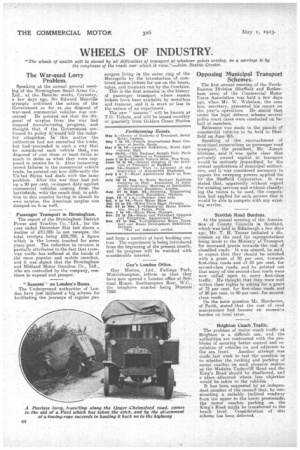
Page 5
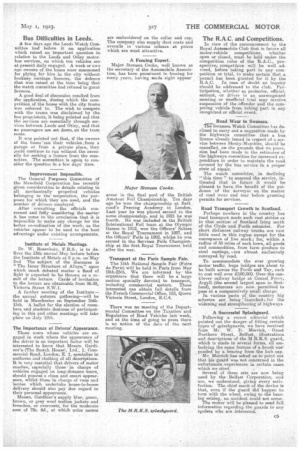
Page 6
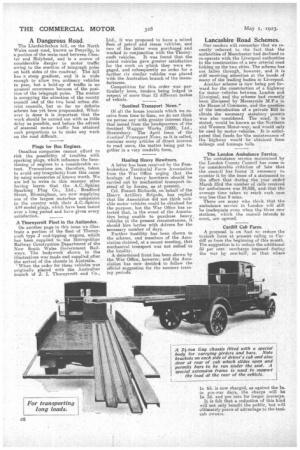
Page 7
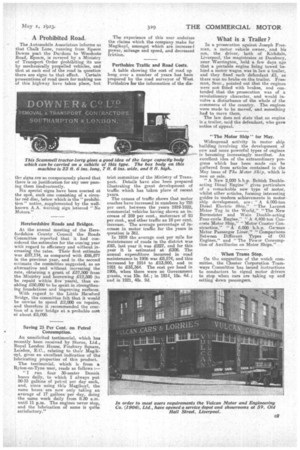
Page 8
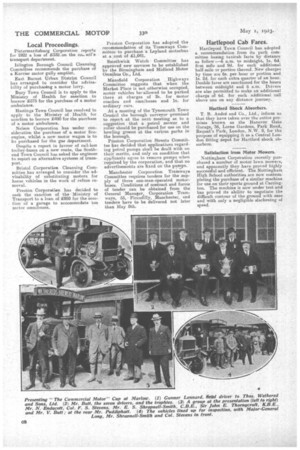
If you've noticed an error in this article please click here to report it so we can fix it.
The wheels of wealth will be slowed by all difficulties of transport al whatever points arising, as a carriage is by the roughness of the roads over which it runs."--John Beattie Crozier.
The War-used Lorry Problem.
Speaking at the annual general meeting of the Birmingham Small Arms Co., Ltd., at the. Daimler works Coventry, a few days ago, Sir Edward Manville strongly criticised the action of the Government so far as ',he disposal of war-used commercial vehicles was concerned • He pointed out that the disposal of surplus from • the war had stopped manufacturing 'progress, and thought that if the Government. continued its policy it: would kill the industry altogether. fo. this matter the authorities had not consulted the trade, but had :proceeded in such a way that he considered each 'vehicle that., was disposed of cost. them at least twice as much in doles as what they were supposed to receive for it. After instancing recent failures in the commercial vehicle trade, he pointed out how differently the Un'ted States had dealt. with the same
• problem. After the war they had :mit up a 90 per cent, re-import duty against commercial vehicles coming from the battlefields, with the result that, in addition to this country having to absorb its own surplus, the American surplus was dumped on it as well.
Passenger Transport in Birmingham.
The report of the Birmingham District Power and Traction Co.,'Ltd., for the year ended December 31st last shows a decline of R11,000 in net receipts, tha total receipts being R88,789, a figure which is the lowest touched for some years 'past. The reduction in revenue is partially attributed to the fact that tramway traffic has Buffered at the hands of the more popular and mobile omnibus, and it was stated that the Birmingham and Midland Motor Omnibus Co., Ltd., who are controlled by the company, continue to expand and prosper.
"Seasons' on London's Buses. The Underground authorities of London have just initiated a big scheme for facilitating the journeys of regular pas sengers. living in the outer ring of the Metropolis by the introduction of combined season tickets for use on the buses, tubes, and tramcars run by the Combine.
This is the first occasion in the history of passenger transport where season tickets have been available by motolbus and tramcar, arid it is more or less in the nature of an experiment.
The new " seasons " will be known as T.O. Tickets, and will be issued monthly Or quarterly from (lolders Greer: Station and from a number of local booking centres The experiment is being introduced from the beginning of the present month, and its progress will be watched with cc.nsiderable interest.
Guy's London Office.
Guy Motors, Ltd., Fallings Park, Wolverhampton, inform us that they have now opened a London office at Sentinel House, Southampton Row, W.C., the telephone number being Museum 7560.
Opposing Municipal Transport Schemes.
The first annual meeting of the NorthEastern Division (Sheffield and Rotherham area) of the Commercial Motor Users Association was held a few days ago, when Mr. W. Iiilakelam, the area hon. secretary, presented his report on the year's operations. He stated that under the legal defence scheme several police court cases were conducted on behalf of members.
Reference was made to the parade of commercial vehicles to be held in Sheffield on June 9th.
Speaking of the encroachment of municipal corporations on passenger road transport, the president, Mr. Joseph Gibbons, said it .was quite clear that privately owned capital in transport would be seriously jeopardized by the annual applications of municipal authorities, and it Was considered necessary to oppose the sweeping powers applied for by the Sheffield Corporation. It was stated that, apparently without regard for existing services and without classifying the routes to be used, the corporation had applied for such powers that it would be able to compete with any existing service.
Scottish Road Burdens.
At the annual meeting of the Association of County Councils in Scotland, which was held in Edinburgh a few days ago, Mr. T. H. Turner initiated a discussion on the need for representations being made to the Ministry of Transport for inorea.sed grants towards the cost of classified roads. It was absurd, he said, to expect that they should he satisfied with a grant of 50 per cent. towards first-class roads and of 25 per cent, for second-class roads, and he pointed out that many of the' second-class roads were now called upon to, carry first-class traffic. He thought that they were well within their rights in asking for a grant of 75 per cent, for first-class roads and of 50 per cent. to 60 per cent. for secondclass roads.
On the same question Mr. Henderson, of Perth, stated that the cost of road maintenance had become an excessi‘e burden on local rates.
Brighton Coach Traffic.
The problem of motor coach traffic at Brighton is a difficult one, and the authorities are confronted with the problems of securing better control and regulation of vehicles on and adjacent to
the sea front. Another attempt was made last week to test the question as to whether the ranking ithd parking of motor coaches on such pleasure centres as the Madeira Undercliff Road and the King's Road should be disallowed, and a place -allocated where less objection would be taken to the vehicles.
It has been suggested by an independent member of the council that, by constructing a suitably inclined roadway from the upper to the lower promenade, the motor coaches parking on the King's Road might be transferred to the beach level. Consideration of this scheme has been deferred.
Bus Difficulties in Leeds.
A few days ago the Leeds Watch Committee had before it an, application which raised an important question in relation to the Leeds and Otley motorbus services, on which ten vehicles are at present daily engaged. A week or two ago owners of the buses were summoned for plying for hire in the city without hackney carriage licence, the defence that was raised at the time being that the watch corrunittee had refused to grant licences.
A good deal of discussion resulted from the applieetion, during which the corneetition of the buses with the city trams was referred to. The wish to compete with the trams was disclaimed by the bus proprietors, it being pointed out that the services are essentially through services between Leeds and-Otley, and that Ito passengers are set down. on the tram route.
It was pointed out that, if the owners of the buses'ran their vehicles,from garage or from a private place, they eould continue to run without the necessily for seeking a licence from the committee. The eommittee is again to consider the question in a few days' time.
Improvement Impossible.
The General Purposes Committee of the Mansfield Corporation has recently given consideration to details relating to all mechanically propelled vehicles belonging to the corporation, the purposes for which they are used, and the number of drivers employed. After consulting the officials concerned and fully considering the-matter it has come to the conclusion that it is impossible to make any change for the better co-ordination of the work, as the vehicles appear to be used to the best advantage under existing arrangements.
Institute of Metals Meetings.
Dr. W. Rosenhaan, F.R.S., is to deliver the 13th annual May lecture before the Institute of Metals at 8 p.m. on'May 2nd The subject of the discourse is "The Inner Structure of Alloys," upon which much debated matter a flood of light is expected to be thrown as a result of the lecture. Carda of invitation to the lecture are obtainable from 36-38, Victoria Street S.W.1.
A further meeting of the Institute-the annual autumn gathering—will be held in Manchester on September kith13th. A ballot for the election of members and students desirous of participetieg in this and other meetings will take place on July 12th, The Importance of Drivers' Appearance.
Those users whose vehicles are engaged in work where the appearance of the driver is an important factor will be interested to know that Messrs. Glaidiner's, (The Scotch Rouse), Ltd., 1, Commercial Road, London, E. 1, specialize in uniforms and clothing of all descriptions. It is very essential that drivers of motor coaches, especially those in charge of vehicles engaged on long-distance tours, should possess a clean and smart appearance, whilst those in charge of vans and lorries which undertake house-to-house delivery should also pay due regard to their personal appearance. Messrs. Gardiner' a supply blue, green, brown, or grey wool rnelton jackets and breeches, or overcoats, for the moderate sum of 79s. 6d., at which price names are embroidered on the collar and cap. The company also supply dust coats and overalls in various colours at prices which are most attractive.
A Fencing Expert.
Major Stenson Cooke, well known as the secretary of the Automobile Association, has been prominent in fencing for many years, having made eight appear
access in the final pool of the British Amateur Foil Championship. Ten days ago he won the championship at. Bert rend's Fencing Academy in London. Last-year he was placed second in the same championship, and in 1921 he was fourth.He was included in the British International Foil team at the Olympic Games in 1912, won the Officers' Sabres at the Royal Tournament in 1897, and the Officers' Foils in 1902, whilst be was second in the Services Foils Championship at the first Royal Tournament held after the war.
Transport at the Paris Sample Fair.
The 15th National Sample Fair (Foire de Paris) will be held in Paris from May 10th-251h. We are informed by the organizers that there will be a large section specially devoted to transport, including commercial motors. Those interested can obtain full details from the French Commercial Office, 153, Queen Victoria Street, London, E.C.4.
There was no meeting of the Departmental Committee on the Taxation and Regulation of Road Vehicles last week, and at the time of going to press there is no notice of the date of the next meeting.
The R.A.C. and Competitions.
In view of the announcement by the Royal Automobile Club that in future all motor-vehicle competitions, whether open or closed, must be held under the competition rules of the R.A.C., prospective i competitors will be well advised, before taking part, in any competition or trial, to make certain that a permit has been granted for it by the R.A.C. In case of doubt an inquiry should be addressed to the club. Participation, whether as proinoter, entrant, or driver in an unrecognized meeting or unofficial trial may involve suspension of the.offender and the competing vehicle from taking part in any recognized or official event.
Road Wear in Swansea.
Tri7Swansea Watch Committee has declined to carry out a suggestion made by the highways committee that a bus. licence already issued in respect of a service between Sketty-Mumbles, should be cancelled, on the grounds that ea) provision had been made in the estitnatee of the highways committee for increased ekpenditure in order to maintain the road, covered by the bus service in a proper state of repair.
The watch committee, in declining "this time" tq suspend the service, intimated that in future it would be pleased to have. the benefit of the guidance'of the surveyor on the matter of road wear and tear before granting permits for services.
Road Transport Growth in Scotland.
Perhaps nowhere in the country has road transport made such vast strides as in that section of Scotland lying north of the Clyde and Forth estuaries. For short distances railway trucks are now little used in this region except foe the conveyance of lire stock; for, within a radius of 30 miles of each town, all goods and commodities, from farm produce to steel castings, flare almost exclusively conveyed by road.
To accommodate the ever growing, motor traffic, huge bridges are about to be built across the Forth and Tay,. each to cost well over £100,000. Over the cantilever railway bridge at Connel Ferry, Argyll (the second largest span in Scotland), motorcars are now permitted to pass at a comparatively small charge.
In various parts of the country big schemes are being.' launched. for the widening and strengthening of highways.
A Successful Splashguard.
Following a recent editorial which pointed out the danger, of fitting certain types of splashguards, we have teceived from Mr. W. D. Merrick, -Great Northern Street,, illustrations and descriptions of the 31 R.K.S. guard, which is madein several forms, all embodying the same feature of a brush suspended by a bearing from the hub cap.
Mr. Merrick has asked us to point out that his guard was not concerned in the unfortunate experiences in certain cases which we cited.
Several of these sets are now being used by the Belfast Corporation, and are, we understand, giving every satisfaction. The chief merit of the device is that, even if the guard didhappen to turn with the wheel, owing to the bear. ing seizing, an accident could not occur.
The maker will be pleased to send full, information regarding the guards to any readers who are interested.
. A Dangerous Road.
The Llaufairfechan hill, on the North Wales coast road, known as Penyclip,-is a portion of the main road between Chester and Holyhead, and is a source of considerable danger to motor traffic owing to the erection of telegraph poles on both sides of the roadway. The hill has a. steep gradient, and it is wide enough to allow two ordinary vehicles to pass, but a hold-up of traffic is no unusual occurrence because of the position -of the telegraph poles. The matter La occupying the attention of the county council and of the two local urban district councils, but so far no definite scheme has yet been propounded. Whatever is done it is important that the work should be carried out with as little delay as possible, and before the advent of seasonal motor traffic has attained such proportions as to make any work on the road difficult.
Plugs for Bus Engines.
Omnibus companies cannot afford te risk the possibility of troubles with sparking plugs, which influence the functioning of engines to a considerable ex.; tent. Precautions are, therefore, taken to avoidany irregularity from this cause by using accessories of known worth. We are led to write in this manner after having learnt that the A.C.-Sphinx -Sparking Plug Co., Ltd., Bradford Street, Birmingham, are now supplying one of the largest motorbus companies in the country with their A.C.-Sphinx A44 model plugs, which have been tested over a long period and have given every satisfaction.
A Thornycroft Fleet in the Antipodes.
On another page in this issue we illustrate a portion of the fleet of Thornycroft type J end-tipping wagons, which has been supplied to the Metropolitan Railway Construction Department of the New South Wales Government Railways. The bodywork shown in the illustrations was made and supplied after the arrival of the chassis in Australia..
When the order for these vehicles was originally placed with the Australian branch of J. I. Thornycroft and Co., Ltd., it was proposed to have a mixed fleet of petrol and steam vehicles, and two of the latter were purchased and worked in conjunction with the Thornycroft vehicles. It was found that the petrol vehicles gave greater satisfaction for the work on .ndlich they were engaged, and subsequently an order for a further six similar vehicles was placed with the Australian branch of the manufacturers.
Competition for this order was particularly keen, tenders being lodged in respect of more than 12 different makes of vehicle.
'Sentinel Transport News."
Of all the house journals which we receive from time to time, we do not think we peruse any with greater interest than that issued from the headquarters of the Sentinel Waggon Works (1920), Ltd., Shrewsbury. The April issue of the Sentinel transport News, as it is called, contains many articles of direct interest to road users, the matter being put together in a very readable form,
Hauling Heavy Howitzers.
A letter has been received by the Perribrokeshiie Territorial Force Association from the War Office urging that the haulage of heavy howitzers should be carried out by mechanical transport instead of by horses, as at present.
Col. Fossett Richards, on behalf of the Heavy Artillery Brigade, has replied
that the Association did not think suit able motor vehicles could be obtained for the purpose, but the War Office has re torted that, in the event of the Association being unable to purchase heavy, vehicles in the present circumstances, it should hire lorries with drivers for the necessary number of days. Further hostility has been shown to the scheme, and members of the Association claimed, at a recent meeting, that mechanical transport was not suited to the locality. A determined front has been shown by the War Office, however, and the Association has now decided to follow the official suggestion for the summer training periods.
Lancashire Road Schemes.
Our readers will remember that we recently referred to the fact that the authorities of Manchester had declined to co-operate with the Liverpool authorities it the construction of a new arterial road linking up the two cities. The scheme has not fallen through, however, and it is still receiving attention at the hands of many of the leading bodies in Liverpool. Another scheme is now being put forward for the construction of a highway for motor vehicles between London and Liverpool, and the scheme had recently been discuSsed by Merseyside M.P.s in the Rouse 'of Commons, and the question of the introduction of a private Bill. to obtain the necessary statutory powers was also considered. The road, it is stated, would be known as the Northern and Western Motor-way, and 'would only be used by motor vehicles. It is anticipated that funds for 'the maintenance of the • highway would be obtained from mileage and tonnage tolls.
The London Ambulance Servic.e.
The ambulance service maintained by the London County Council has come in for considerable criticism of late that the tounell has found it necessary to counter it by the issue of a statement to the effect that during the, year ended March 23rd the number of calls received for ambulances was 24,626, and that the average time taken to reach each case was less than 9 mins. .
There are many who think that the ambulance service in London will still be inadequate even when the three new stations, which the council intends to erect, are opened.
Cardiff Cab Fares.
A proposal is on foot te reduce the taxicab fares at. present ruling in Cardiff as from the beginning of this month. The suggestion is to reduce the additional 60 per cent. surcharge imposed during the war by one-half, so that where
A Prohibited Road.
The Automobile Associatioe informs us that Chalk Lane, running from Epsom Dovvris peat the Durdans to Woodeote Road, Epsom, is covered by a Ministry of Transport Order airohibiting its use by mechanically propelled vehicles, and that at each end of the road in question there are signs to that effect. Certain prosecutions of road risers for making use of this highway have taken place, but the, signs are so conspicuously placed that there is no justification for any user passing them inadvertently. Six special signs have been erected at the spot, each one consisting of a circular red disc, below which is the "prohibition" notice, supplemented by the wellknown A.A. Warning sign lettered "No Motors."
Herefordshire Roads and Bridges.
At the annual meeting of the Herefordshire County Council the Roads Committee reported that it had considered the estimates for the coming year with regard to efficiency and without increasing the rates. Their first estimate was £87,174, as compared with £86,877 in the previous year, and in the second eetima,te the committee suggested, as an alternative and without increasing the rate, obtaining a grant. of £37,500•from the Ministry and borrowing £12,500 (to be repaid within five years), thus enabling £50,000 to be spent in strengthening foundations and improving surfaces. With regard to the Little Hereford Bridge, the committee felt that it would be unwise to spend £2,000 on repairs, and therefore it recommended the erection of a new bridge at a probable cost Qi about £5,000.
Saving 25 Per Cent. on Petrol Consumption.
An unsolicited testimonial, which has recently been received by Sterns, Ltd., Royal London HOUSE!, Finsbury Square, London, E.C., relating to their Magikoyl, gives an excellent indication of the lubricating properties of this product. The testimonial, which is from a Ryton-on-Tyne user, reads as follows :—
"I run four 30-seater Dennis buses daily, to which I always put 20-23 gallons of petrol per day each, and, since using this afagikoyl, the same buses are now only taking an average of 17 gallons per day, doing the same work daily from 8.30 a.m. until 11 p.m. The engines never stop, and the lubrication of same is quite satisfactory." The experience of this user endorses the claims which the company make for Magikoyl, amongst which are inereasel power, mileage and speed, and decreased friction.
Perthshire Traffic and Road Costs.
A table showing the cost of road up keep over a number of years has been prepared by the road surveyor of West Perthshire for the information of the dis trict committee of the Ministry of Transport. Details have also been preparedillustrating the great development of traffic which has taken place of recent years. The census of traffic shows that motor coaches have increased in numbers by 725 per cent, between the years 1919-1922, commercial vehicles having shown an increase of 259 per cent., motorcars of 93 per cent., and other traffic an 18 per cent. increase. The average percentage of increase in motor traffic for the years in question is 361. In 1919 the average cost per mile for maintenance of roads in the district was £83, last year it was £227, and for this year it is estimated at £308. The annual expenditure incurred in road maintenance in 1906 was £8,574, and this increased by 1914 to £13,000, and in 1921 to £35,364. The cost per head in 1906, when there were no Government grants, was 10s. 8d. ; in 1914, 18s. 4d.; and in 1921, 48.s. 9d.
What is a Trailer ?
In a prosecution against Joseph Freeman, a motor vehicle owner, and his son, the driver, both of Kirkdale, Liverpool, the magistrates at Darsbury, near Warrington, held a few days ago that a portable engine being towed behind a motor wagon was in law a trailer, and they fined each defendant £1. as there was no brake on the trailer. Freeman, Senn, pointed out that the engines were not fitted with brakes, and contended that the prosecution was of a revolutionary character, and would involve a disturbance of the whole of the commerce of the country. The engines were made to be moved, and something had to move them.
The law does not state that an engine is a trailer, said the defendant, who gave notice of appeal.
" The Motor Ship" for May.
Widespread activity in motor ship building involving the development of new and more powerful types of engines is becoming increasingly manifest. An excellent idea of the extraordinary progress which has been made can be gathered from articles contained in the May issue of The Motor Ship, which is now on sale.
"A New 2,000 blip. British Doubleacting Diesel Engine" gives particulars of a remarkable new type of motor, whilst other articles, forming interesting guides to modern achievements in motor ship development, are "A 6.000-ton Diesel Electric Shin," "The Largest Motor Tug in the World," "The New Burmeister and Wain Double-acting Four-cycle Engine," " A 4,400-ton Concrete Motor Ship," "Motor Coaster Construction," "A 6.000 b.h.p. German Motor Passenger Liner," " Comparisons Between Different Types of Oil Engines," and "The Power Consumption of Auxiliaries on Motor Ships."
When Trams Stop.
On the suggestion of the watch corn. mittee, the Chester Corporation Tramways Committee ha-e issued instructions to conductors to signal motor drivers to stop when cars are taking up and 'setting down passengers.
Local Proceedings.
Pietermaritzburg Corporation reports for 1904 a loss of £332.on the cos scils transport department.
Islington Borough Council Cleansing Committee recommends the purchase of a Karrier motor gully emptier.
East Barnet Urban District Council has arranged to consider the advisability of purchasing a motor lorry.
Bury Town Council is to apply to the Ministry of Health for sanction to borrow £575 for the purchase of a motor ambulance. .
Hastings Town Council has resolved to apply to the Ministry of Health for sanction to borrow £409 for the purchase of a motor ambulance.
Nelson Corporation has under consideration the purchase of a motor fireengine, whilst a new motor wagon is to bs purchased for the gas department.
Despite a report in favour of rail-less trolley-buses on a new route, the Southend town Council has asked the engineer to report on alternaIive systems of transport.
Bristol Corporation Cleansing Committee has arranged to consider the advisability of substituting motors for horse vehicles in the work of refuse removal.
Preston Corporation has decided to seek the sanction of the Ministry of Transport to a loan of £950 for the erection of a garage to accommodate ten motor omnibuses. Preston Corporation has adopted the recommendation of its Tramways Committee to purchase a Leyland motorbus at a cost of £1,041.
Smethwick Watch Committee has approved new services to be established by the Birmingham and Midland Motor Omnibus Co., Ltd.
Mansfield Corporation _ Highways Committee suggests that when the Market Place is not otherwise occupied, motor vehicles be, allowed to be parked there at charges of 2s. for motor coaches and omnibuses and Is. for ordinary cars.
At a meeting of the Tyneraouth Town Council the borough surveyor promised to report at the next meeting as to a suggestion that a petrol mower and roller should be purchased for use on the bowling greens at the various parks in the borough.
Preston Corporation Streets Committee has decided that applications regarding petrol pumps shall be dealt; with on their merits, and only on condition that applicants agree to remove pumps when required by the corporation, and that no advertisements are fixed on the pumps.
Manchester Corporation Tramways Committee requires tenders for the supply of three one-man-Operated motorbuses. Conditions of contract and forms of tender can be obtained from the General Manager, Corporation Tram. ways, 55, Piccadilly, Manchester, and tenders have to be delivered not later than May 8th.
HartlepOol Cab Fares.
Hartlepool Town Council has adopted a recommendation from its park committee basin.taxicab fares by distance as follow a.m. to midnight, is. 6d: first mile and 9d. for each additional half-mile or portion thereof. New charges by time are 6s. per hour or portion and Is. 2d. for each extra quarter of an hour. Double fares are sanctioned for the hours between midnight and 6 a.m. Thivers are also permitted to make an additional charge of 6d. for each additional call above one on any distance journey.
Hartford Shock Absorbers.
T. B. Andre and Co., Ltd., inform us that they have taken over the entire premises known as the Hanover Gate Garage, -36, Lorne Gardens, Park Road, Regent's Park, London, N.W. 8, for the purpose of equipping it as a Central London fitting depot for Hartford shock absorbers.
Satisfaction from Motor Mowers.
Nottingham Corporation recently purchased a number of motor lawn mowers, and apparently they have .proved highly successful and efficient. The Nottingham High School authorities are now conteme plating the purchase of a similar machine for use on their sports ground at Carting. ton.. The machine is now under test and has proved its ability to negotiate the difficult contour of the ground with ease and with only a negligible slackening of speed.
































